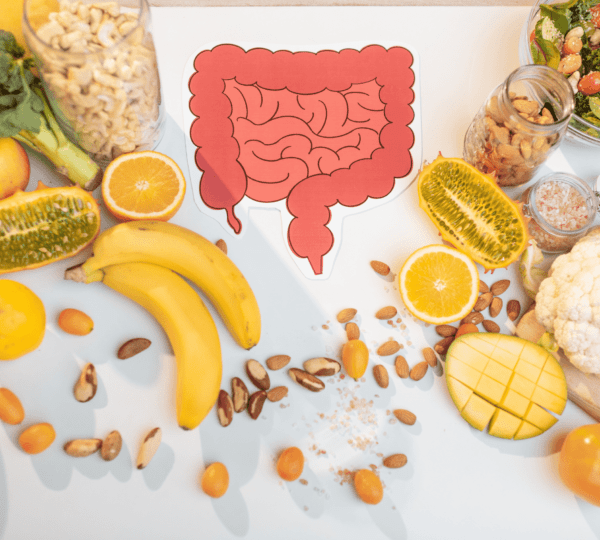
Using Mindful Eating to Improve Digestion
One rainy afternoon, I walked into a cozy café and found a seat by the window. I loved watching the raindrops slide down the glass while I enjoyed the smell of fresh coffee. My attention turned to a couple sitting at a corner table. They were sharing a plate of pastries, smiling and talking animatedly. It was clear they were really enjoying their time together, savoring each bite and laughing as they shared stories.
Nearby, a little girl sat at another table, but she seemed distracted. She picked at her food while her eyes were glued to the colorful drawings in her sketchbook. It looked like she wasn’t really paying attention to her meal. Watching her made me think about how often I eat while doing something else, like watching TV or scrolling through my phone. I’d often find myself feeling stuffed but unsatisfied afterward.
Seeing the couple enjoy their food so mindfully made me realize how important it is to pay attention to what we eat. Mindful eating helps us focus on our meals, notice the flavors, and listen to our bodies. When we eat this way, we can improve our digestion and feel better overall.
In a world where multitasking has become the norm, the concept of mindful eating has emerged as a powerful antidote to digestive distress. According to a study published in the Journal of Nutrition, approximately 74% of adults report experiencing digestive issues at some point in their lives, often exacerbated by poor eating habits and lack of attention to the meal at hand. By incorporating mindful eating practices, we can foster better digestion, reduce discomfort, and ultimately enhance our overall well-being.
What is Mindful Eating?
Mindful eating is a practice derived from mindfulness, a form of meditation that focuses on being fully present in the moment. It encourages individuals to engage all their senses when consuming food and to pay attention to the experience of eating, including the taste, texture, and aroma of food. According to Dr. Jon Kabat-Zinn, the founder of the Mindfulness-Based Stress Reduction program, mindfulness can significantly reduce stress and improve health, including digestive health.
The essence of mindful eating lies in awareness and intention. It’s about savoring each bite, listening to your body’s hunger cues, and appreciating the nourishment that food provides. This approach not only enhances the eating experience but also promotes better digestion by encouraging slower eating and improved food choices.
The Benefits of Mindful Eating for Digestion
- Improved Digestion and Nutrient Absorption When we eat mindfully, we tend to chew our food more thoroughly, which is crucial for the digestive process. Chewing breaks down food into smaller particles, allowing digestive enzymes to work more efficiently. Research from the American Journal of Clinical Nutrition indicates that proper chewing can enhance nutrient absorption and reduce the risk of digestive issues.
- Reduced Overeating Mindful eating helps cultivate an awareness of hunger and fullness signals. Studies have shown that individuals who practice mindful eating are less likely to overeat. According to a 2020 study published in the Journal of Health Psychology, participants who engaged in mindful eating techniques reported lower levels of food intake and a greater awareness of their body’s hunger signals.
- Decreased Stress and Anxiety Stress is a significant contributor to digestive problems. The gut and brain are closely connected, often referred to as the gut-brain axis. High-stress levels can lead to various digestive issues, including irritable bowel syndrome (IBS). Mindfulness practices, including mindful eating, can reduce stress and promote relaxation, leading to improved digestive health.
- Enhanced Enjoyment of Food Mindful eating allows us to enjoy our meals fully. Instead of rushing through lunch at our desks, we can take the time to appreciate the flavors and textures of our food. This enjoyment can lead to a more satisfying meal experience and reduce the desire for unnecessary snacking.
How to Practice Mindful Eating
- Create a Distraction-Free Environment Start by setting the stage for mindful eating. Turn off screens, put away your phone, and sit down at a table. Creating a calm, distraction-free environment helps you focus on your meal.
- Engage Your Senses Take a moment to observe your food. Notice the colors, textures, and aromas. As you eat, pay attention to the flavors and how the food feels in your mouth. Engaging your senses makes the eating experience richer and more fulfilling.
- Eat Slowly and Chew Thoroughly Take smaller bites and chew your food slowly. Aim to chew each bite at least 20 times before swallowing. This practice not only aids digestion but also helps you appreciate the meal more fully.
- Listen to Your Body Tune into your hunger and fullness cues. Before you start eating, ask yourself how hungry you are on a scale of 1 to 10. Throughout the meal, check in with your body to determine if you’re still hungry or if you’re starting to feel full.
- Practice Gratitude Before you eat, take a moment to express gratitude for your food. Acknowledge the effort that went into bringing the meal to your table, from the farmers to the cooks. This practice can enhance your appreciation for food and improve your overall eating experience.
Expert Opinions on Mindful Eating
Experts agree that mindful eating can significantly impact digestive health. Dr. Susan Albers, a clinical psychologist and author of “Eating Mindfully,” emphasizes that mindful eating is about shifting your focus from the food itself to the experience of eating. She notes that “when you are present with your food, you will find it easier to make healthier choices and notice how different foods make you feel.”
Furthermore, Dr. Linda Bacon, a health professor and author of “Health at Every Size,” advocates for mindful eating as a way to foster a healthier relationship with food. She states, “Mindful eating allows you to tune into your body’s natural cues for hunger and satisfaction, promoting a more intuitive approach to eating.”
Recent Research Supporting Mindful Eating
Recent studies have highlighted the benefits of mindful eating on digestive health. A 2021 meta-analysis in Appetite found that mindfulness-based interventions significantly reduced binge eating behaviors and emotional eating, leading to improved digestive health outcomes. Another study published in the Journal of Eating Disorders found that participants who practiced mindful eating reported decreased digestive distress and improved overall satisfaction with meals.
Moreover, a randomized controlled trial published in Nutrition Research in 2022 demonstrated that participants who underwent a mindful eating program experienced significant improvements in gastrointestinal symptoms and overall quality of life compared to a control group.
Tips for Incorporating Mindful Eating into Your Daily Routine
- Start Small Begin by incorporating mindful eating into one meal a day. As you become more comfortable with the practice, gradually extend it to other meals.
- Use Mindful Eating Prompts Set reminders or prompts to practice mindfulness during meals. This could be a sticky note on your fridge or a timer that reminds you to slow down and engage your senses while eating.
- Join a Mindful Eating Group Consider joining a mindful eating group or workshop. Engaging with others who are interested in this practice can provide support and enhance your learning experience.
- Reflect on Your Eating Experience After each meal, take a moment to reflect on your experience. What did you enjoy? How did the food make you feel? This reflection can deepen your mindfulness practice.
- Be Patient and Kind to Yourself Mindful eating is a skill that takes time to develop. Be patient with yourself and recognize that it’s okay to have distractions or moments of mindlessness. The goal is to cultivate awareness over time.
Conclusion: Embrace the Journey to Better Digestion
By adopting mindful eating practices, you can transform your relationship with food and improve your digestion. This journey toward better digestive health is not just about what you eat but how you eat. Remember to create a peaceful eating environment, engage your senses, and listen to your body’s cues. With patience and practice, you can reap the rewards of improved digestion and overall well-being.
References
- Kabat-Zinn, J. (1990). Full Catastrophe Living: Using the Wisdom of Your Body and Mind to Face Stress, Pain, and Illness. Delta.
- Albers, S. (2012). Eating Mindfully: How to End Mindless Eating and Enjoy a Balanced Relationship with Food. New Harbinger Publications.
- Bacon, L. (2010). Health at Every Size: The Surprising Truth About Your Weight. BenBella Books.
American Journal of Clinical Nutrition. (2016).
- “The Importance of Chewing: A Key to Nutrient Absorption.”
Journal of Health Psychology. (2020).
- “Mindful Eating: A Key to Healthy Eating Habits.”
Appetite. (2021).
- “Mindfulness-Based Interventions: Effects on Binge Eating Behaviors.”
Nutrition Research. (2022).
- “The Impact of Mindful Eating on Gastrointestinal Symptoms and Quality of Life.”












